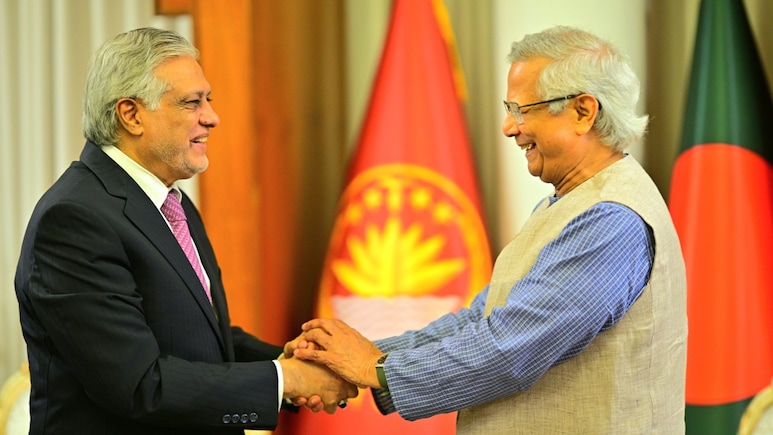Pakistan's Foreign Minister, Ishaq Dar, recently held talks with senior Bangladeshi officials and politicians, including Chief Adviser Muhammad Yunus, in what is being seen as a mutual effort to repair frayed ties. Dar's visit marks the first by a Pakistani Foreign Minister to Bangladesh in 13 years, the last being Hina Rabbani Khar's brief trip in 2012.
During the visit, both sides signed six key agreements to institutionalise cooperation across sectors of the economy, diplomacy, education and media. These include a visa exemption for diplomatic and official passport holders, the formation of a Joint Working Group on trade to enhance economic cooperation, and collaboration between foreign service academies for diplomatic training. Additionally, the state news agencies of both countries agreed to cooperate on media exchanges. A Bangladesh-Pakistan Knowledge Corridor Initiative was also announced by Pakistan, offering 500 scholarships over five years to Bangladeshi students.
This tilt in ties comes after years of Dhaka's pro-India orientation under Prime Minister Sheikh Hasina, who shared an amicable rapport with New Delhi for decades. In contrast, Bangladesh-Pakistan relations were effectively suspended during Hasina's tenure.
A Slew Of Firsts
While recent progress in bilateral relations has been gradual, momentum has been steadily building under Yunus' administration. This has manifested in high-level diplomatic exchanges, new economic and trade initiatives, including a reported trade target of USD 3 billion, easing of travel restrictions and steps toward bolstering military cooperation. The latest engagement in Dhaka reportedly centred on expanding commercial and economic cooperation, highlighting a shared willingness to cautiously improve ties despite decades of mistrust rooted in history.
The Apology That Never Came
However, the question of an official apology for Pakistan's role in the 1971 war continues to remain a deep-rooted, sensitive issue in ties between Dhaka and Islamabad. Responding to a reporter, Dar mentioned that the issue had been settled through the 1974 tripartite agreement with Bangladesh and India, and reiterated that former Pakistan President Pervez Musharraf had already issued “deep regret” during his visit to Bangladesh in 2002. That said, both instances fell short of a formal apology, leaving the issue contentious.
This was seen in the dismissal of Dar's statement by the Bangladeshi Advisor for Foreign Affairs, Md. Touhid Hossain. He said, “No, I don't [accept it]. If I did, the problem would have been resolved.” He further reiterated Dhaka's demands concerning financial compensation and the repatriation of citizens.
Also Read | "If India Attacks Pak, Bangladesh Should...": Muhammad Yunus Aide On Northeast
The recurrence of the apology debate echoes other unresolved historical events across the world. Much like the tense South Korea and Japan relationship, in which Tokyo's repeated expression of “regret” over wartime atrocities and the ‘comfort women' issue has been inadequate to meet Seoul's demands for acknowledgement and restitution. Similar strains can be witnessed in Turkey's refusal to acknowledge the Armenian genocide, or in arguments surrounding colonial reparations. In all these contexts, the impasse in ties informs how the language of symbolism - regret versus apology - continues to pose incredible hurdles in normalising relationships. In each of these cases, the choice of words - which carry political weight - has shaped national identity and collective memory, thereby impacting bilateral ties.
India Must Remain Patient
While New Delhi has so far refrained from commenting on the increasing rapprochement between Bangladesh and Pakistan, it will certainly keep a close eye on these developments. India must remain patient with Bangladesh, for, the country is slated to hold elections in February 2026, and the outcome could recalibrate Dhaka's foreign policy. The opposition Bangladesh Nationalist Party (BNP), which has signalled intentions to mend ties with India, is currently favoured to win.
However, in the long term, India has less to worry about. New Delhi's economic and strategic upper hand through mediums of trade, energy, connectivity, and geography will be difficult for Pakistan to match. India's investment ties with Bangladesh are far more diversified than Pakistan's. The trade between India and Bangladesh reached nearly USD 13 billion, compared to just USD 865 million worth of trade between Pakistan and Bangladesh. India also remains a crucial investor across Bangladesh's key sectors such as textiles, energy, pharmaceuticals, and infrastructure, with significant projects such as the Friendship Pipeline and special economic zones. In comparison, Pakistan's trade with Bangladesh is currently focused on raw materials. As such, India's long-standing and deep economic relations with Bangladesh will be difficult to displace through the current pace of Bangladesh-Pakistan engagement. While Pakistan may continue to appeal through symbolic gestures to Bangladeshi identity and play up shared Islamic orientation, India offers tangible developmental dividends that Dhaka requires.
Also Read | "Ready For Dialogue With India In Dignified, Respectful Manner": Pak Foreign Minister
In the immediate term, India's concerns are largely centred around the security of India's northeastern borders, where infiltration bids and militancy by Islamist extremists remain long-standing issues. India will especially be sensitive about the strategic Siliguri corridor, also known as the ‘Chicken's Neck', which connects the northeastern states to the rest of India. As such, India's strategic calculus will be contingent on the incoming Bangladeshi government's relationship with Pakistan in comparison to its ties with New Delhi. The trajectory of Pakistan-Bangladesh ties will inevitably inform a large part of India's neighbourhood strategy.
(Aishwaria Sonavane is a research analyst at the Takshashila Institution)
Disclaimer: These are the personal opinions of the author



